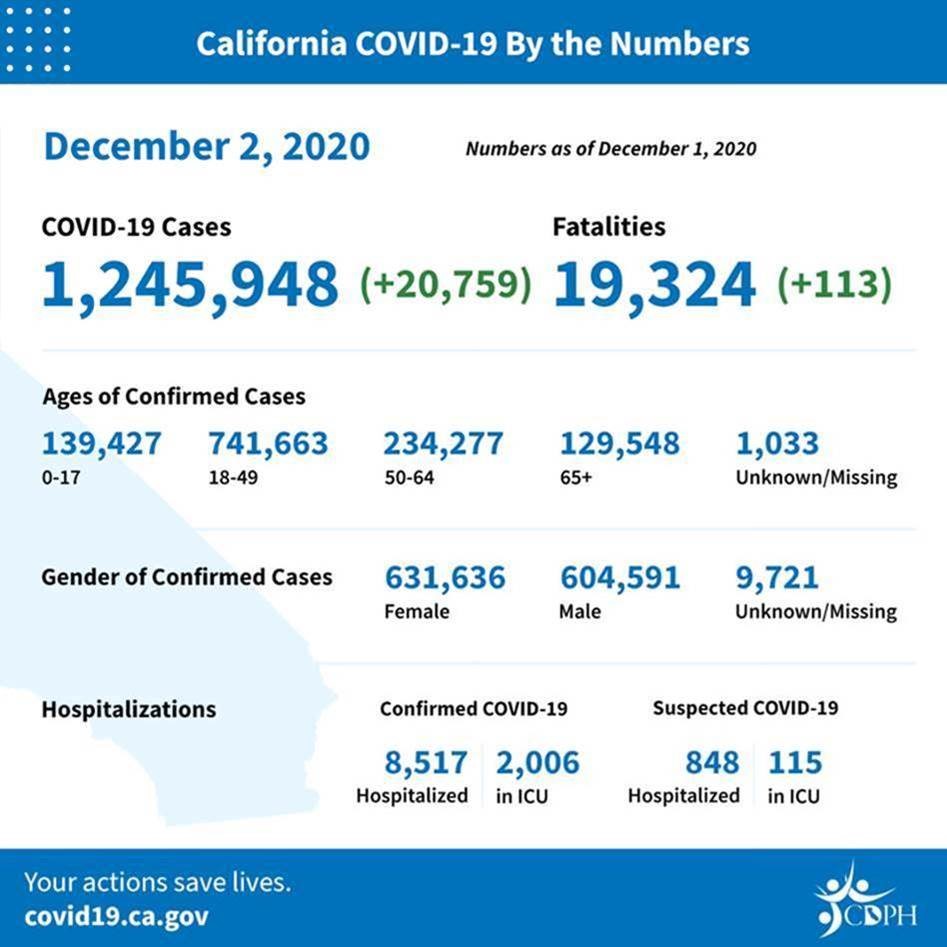
December 3, 2020 - Vision in Action No. 13

Gov. Gavin Newsom Announces Impending Stay-at-Home Order for Majority of California as COVID-19 Cases Surge
Gov. Gavin Newsom today announced he will issue a regional stay-at-home order for five California regions when ICU capacity falls below 15% in those areas. The regions include:
- Northern California: Del Norte, Glenn, Humboldt, Lake, Lassen, Mendocino, Modoc, Shasta, Siskiyou, Tehama, Trinity
- Bay Area: Alameda, Contra Costa, Marin, Monterey, Napa, San Francisco, San Mateo, Santa Clara, Santa Cruz, Solano, Sonoma
- Greater Sacramento: Alpine, Amador, Butte, Colusa, El Dorado, Nevada, Placer, Plumas, Sacramento, Sierra, Sutter, Yolo, Yuba
- San Joaquin Valley: Calaveras, Fresno, Kern, Kings, Madera, Mariposa, Merced, San Benito, San Joaquin, Stanislaus, Tulare, Tuolumne
- Southern California: Imperial, Inyo, Los Angeles, Mono, Orange, Riverside, San Bernardino, San Diego, San Luis Obispo, Santa Barbara, Ventura
No areas are yet affected by the order but the governor warned it will begin within 48 hours once a region reaches that 15% ICU availability threshold. Once the order begins:
- Schools that are open can remain open
- Private gatherings of any size will be prohibited
- Bars, wineries and personal services will be temporarily closed
- Restaurants must return to takeout only and end outdoor dining
- Indoor retail will be capped at 20% of capacity
The order will remain in effect for at least three weeks and, after that period, will be lifted when a region’s projected ICU capacity meets or exceeds 15%. This will be assessed on a weekly basis after the initial 3 week period.
The order has some limited impact to community colleges as most remain on a primarily online/remote learning. Essential Infrastructure Workforce Programs are allowed to meet in-person but with physical distancing protocols. Colleges that are requiring in-person meetings for final exams will have to adapt to the new order and the Chancellor’s Office will work to provide flexibility to do so.
The governor today also announced all non-essential travel is now temporarily restricted statewide.
Newsom said he believes this will be the final stay-at-home order he will need to issue, as California will begin receiving doses of the COVID-19 vaccine within the next few weeks. The Drafting Guidelines Workgroup & Community Advisory Committee have finalized recommendations on who will receive initial doses. The first three groups include front-line health care workers, skilled nursing facility workers, public health field staff and lab workers.
Find the latest information on California COVID-19 website.

System Guidance/News
Join us for the next Chancellor’s Office system webinar on Wednesday, December 16 at 9:00 a.m. If you haven’t already done so, you can register for the webinars at this link. Previous webinar recordings are available on the Vision Resource Center.
Registration is now open for the virtual 2020 California Community Colleges Veterans Symposium, scheduled for Tuesday-Thursday, December 8-10. Join faculty, administrators and staff from across the California Community Colleges, California State University and University of California systems to share information and best practices for supporting our student veterans. Learn more and register.
The Chancellor’s Office is committed to keeping everyone informed during this uncertain time. We encourage administrators, faculty, staff and students to regularly check the Chancellor’s Office COVID-19 resource page and the Chancellor’s Office Communications to Colleges section for ongoing executive orders, guidance memos and announcements. Current and prospective students can also get connected with their local college to find out specific resources and support services available as well as enroll in their local community college.
![]()
Online Instruction/Webinars
The California Counseling Network, a community of practice sponsored by the Career Ladders Project, is hosting a series of Counselor Roundtable zoom sessions. Each session is an opportunity to gather with fellow practitioners from colleges and high schools and engage in conversations that matter and support our work with students and colleagues. The next session is Friday, December 4 from 12:00 - 1:30 p.m. and the focus is Teaching Counseling Courses: Engaging our students in a virtual reality. Register.
The Accrediting Commission for Community and Junior Colleges is pleased to present this December an online seminar series called The Future of Learning: An Equity-Minded Approach. The series is presented in partnership with the California Community Colleges, the Academic Senate for California Community Colleges, the Pacific Postsecondary Education Council and the University of Hawai'i Community Colleges. The webinars will continue on December 7 and 8 from 2:00 – 4:00 p.m. Registration is now open. View the event website.
Join attorneys from the Immigrant Legal Resource Center as they provide an analysis of the impact of the election on immigration issues, information on what we might expect in the coming year, and resources for more help and information. Following the presentation from the ILRC, the Foundation for California Community Colleges will share how to access the free immigration legal services that are available to students, staff and faculty affiliated with the community colleges. The webinar is Wednesday, December 9 at 12:00 p.m. Register.
Dr. Estela Mara Bensimon - one of the nation’s leading scholars on racial equity, organizational learning and practitioner inquiry and change - will be conversing with the Learning Lab community about the meaning of racial equity. This event is the first of a four-part equity conversation series. We invite you to join this important conversation on Friday, December 11th at 12:00 p.m. Register.
Student Supports
The California Youth Crisis line runs 24-hours a day, seven days a week: 800-843-5200. The National Suicide Prevention Lifeline provides confidential assistance to anyone in crisis and their loved ones through a live chat and free 24-hour hotline at 800-273-8255. You can also text COURAGE to the Crisis Text Line at 741741.
Items of Interest
Momentum builds for bipartisan $908 billion stimulus package as more GOP senators express support.
Stay home for the holidays or get tested twice, CDC recommends.
‘Absolutely normal’: COVID vaccine side effects are no reason to avoid the shots, doctors say.

